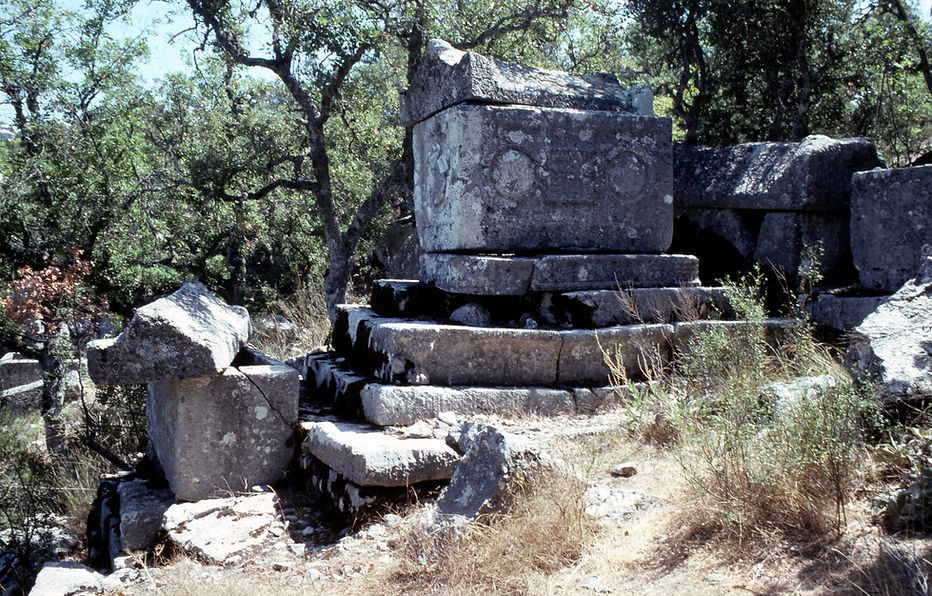


TERMESSOS III
TERMESSOs / PISIDIA
OTHER PARTS OF THE CITY
One of the most interesting strucrures in the area is a building in the form of a typical Roman period house. An inscription can be seen above the Doric order doorway along the west wall, which rises to a height of six metres. In this inscription the owner of the house is praised as the founder of the city. Doubtless, this house was not really that of the founder of Termessos. Maybe it was a little gift awarded the owner for extraordinary service rendered to the city. This type of house generally belonged to nobles and plutocrats. The main entrance gives onto a hall which leads through a second entrance to a central courtyard, or atrium. An impluvium or pool designed to catch rainwater lies in the middle of the courtyard. The atrium held an important place in the daily activities of houses such as this, and was also used as a reception room for guests. As such it was often ostentatiously decorated. The other rooms of the house were arranged around the atrium.
A street with wide, shop-lined porticoes ran north–south through the city. The space between the columns of the porticoes was often filled with statues of successful athletes, most of them wrestlers. The inscribed bases for these statues are still in place, and by reading them we can recreate the ancient splendour of this street.

Click on the pic. to zoom in

Click on the pic. to zoom in
Termessos Colonnaded street
Necropolis
To the south, west and north of the city, mostly within the city walls, there are large cemeteries containing rock-cut tombs, one is supposed to have belonged to Alcetas himself. Unfortunately the tomb has been despoiled by treasure hunters. In the tomb itself a kind of lattice work was carved between the columns behind the kline; at the top there was probably an ornamental frieze. The left part of the tomb is decorated with the depiction of a mounted warrior dateable to the 4th century BC. it is known that the youth of Termessos, much affected by the death of General Alcetas, built a magnificent tomb for him, and the historian Diodoros records that Alcetas did battle with Antigonos while mounted on a horse. These coincidences suggest that this is indeed the tomb of Alcetas and that it is he who is depicted in the relief.

Click on the pic. to zoom in
Relief of Alcetas in his Monumental Tomb
The sarcophagi, hidden for centuries among a dense growth of trees south-west of the city, transports one in an instant to the depths of history ceremony, the dead were placed in these sarcophagi along with their clothing, jewellery, and other rich accouterments. The bodies of the poor were buried in simple stone, clay, or wooden sarcophagi. Dateable to the 2nd and 3rd centuries AD, these sarcophagi generally rest on a high pedestal. In the family tombs of the wealthy on the other hand, the sarcophagi were placed inside a richly ornamented structure built in the shape of the deceased together with his lineage, or the names of those given permission to be buried alongside him. Thus the right of usage was officially guaranteed. In this manner the history of one specific tomb can be ascertained. In addition, one finds inscriptions calling on the fury of the gods to prevent the sarcophagi from being opened and to scare away grave robbers. The inscriptions also state the fines meted out to those who did not conform to these rules. These fines, ranging from 300 to 100,000 denarii and generally paid to the city treasury in the name of Zeus Solymeus, took the place of legal judgments.

Click on the pic. to zoom in
Termessos, after a gradual decline, was finally abandoned in the 5th century. Some of the remains found there are the walls, the Hadrian's triumphal arch, the cisterns, the theater, the gymnasium, the agora, the odeon and the heroon. Among the tombs which are scattered far and wide can be seen those of Alcates, Agatemeros and the Lion decorated sarcophagi, which are extraordinary.
Click on the pic. to zoom in


Rock Cut Tomb

Remains of city gate and city walls


Lycian type tomb on western necropolis





